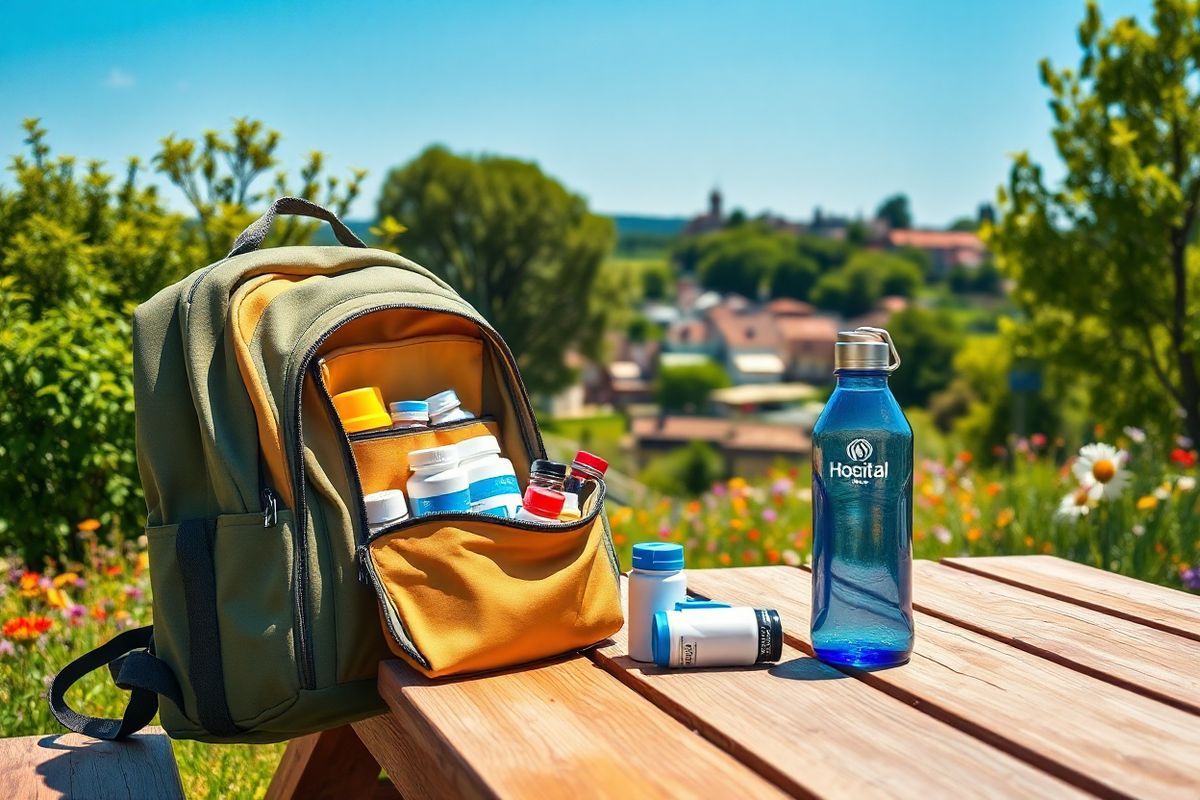Table of Contents
Preparing for Your Journey: Essential Steps for IBD Travelers

Before embarking on your journey, it is crucial to plan meticulously. Research your destination to understand the availability of medical facilities and local healthcare options. Knowing where hospitals and pharmacies are located can significantly reduce anxiety during your trip. It’s advisable to keep a list of important contacts, including your gastroenterologist and local IBD support groups.
A good rule of thumb is to ensure your IBD has been stable for at least three months before traveling. Symptoms can flare due to various factors such as stress or dietary changes, making it prudent to choose travel dates that minimize these risks.
Vaccinations and Health Precautions
If traveling internationally, consult with your healthcare provider regarding necessary vaccinations. Some vaccines may not be suitable for individuals on immunosuppressive therapy. For instance, live vaccines could pose risks if your immune system is compromised (Leong et al., 2024). Always check vaccination requirements at least 6 to 8 weeks prior to your departure.
Medication Management
Bring along an adequate supply of medications, including extra doses in case of delays. All medications should be kept in their original containers and packed in your carry-on luggage to prevent loss. Familiarize yourself with proper storage requirements, especially for biologics that may need refrigeration (Bora et al., 2024).
Packing Smart: Must-Have Items for Traveling with Inflammatory Bowel Disease
When packing for your journey, consider the following essential items:
- Medications: Include all prescription medications, over-the-counter drugs that you may need, and any necessary medical supplies such as syringes or infusion equipment for biologics.
- Emergency Kit: Assemble a travel kit with toiletries, wet wipes, disposable bags for any waste, and extra clothing.
- Food and Snacks: Bring safe snacks that you know won’t trigger your symptoms. This is particularly important when traveling to areas where food options may be limited.
- Documentation: Carry a letter from your doctor stating your medical condition and the necessity of your medications, especially if traveling internationally.
Navigating Dietary Challenges: Eating Well While Traveling with IBD
Dietary management is a critical aspect of traveling with IBD. Here are strategies to maintain a safe diet while on the go:
Research Local Cuisine
Before visiting a new place, research local diets and restaurant menus. It’s advisable to avoid foods that are known triggers for your symptoms. Many travelers with IBD find comfort in preparing meals themselves when possible. If your accommodation has kitchen facilities, consider preparing simple, safe meals using local ingredients.
Staying Hydrated
Staying hydrated is essential, especially during travel. Carry a refillable water bottle to ensure you are drinking enough fluids and avoid dehydration, which can exacerbate IBD symptoms.
Choosing Safe Foods
Limit your intake of greasy, processed foods, and opt for well-cooked meals. Be cautious with raw foods, particularly if you are in a region where food safety is a concern. Pack familiar snacks, such as crackers or energy bars, for long journeys (Bora et al., 2024).
Staying Healthy on the Go: Managing Symptoms During Travel
While traveling, it’s important to have a plan in place for managing potential symptoms or flare-ups.
Keeping Calm
Stress can trigger flare-ups, so prioritize relaxation techniques during your travels. Consider practicing mindfulness or breathing exercises to help manage anxiety.
Emergency Preparedness
Have a plan of action if you experience a flare-up while away. Carry a list of your medications, healthcare contacts, and your health insurance information. If you need medical assistance, use your travel insurance for support in finding local healthcare services (Leong et al., 2024).
Emergency Preparedness: What to Do If You Experience a Flare-Up While Traveling
Despite careful planning, emergencies can still arise. Here’s how to handle them effectively:
- Know Your Resources: Identify local hospitals and pharmacies in advance. Have the contact information for your healthcare provider readily available.
- Insurance Details: Ensure your travel insurance covers medical needs related to IBD, including any necessary medications or treatments.
- Emergency Kit: Keep an emergency kit containing essential supplies, medication, and a list of emergency contacts.
FAQ
What should I do if I experience a flare-up while traveling?
It’s important to have a plan in place. Contact your healthcare provider, utilize your travel insurance for local medical assistance, and know where the nearest hospital is located.
Can I travel if my IBD is not in remission?
While it’s safer to travel during remission, many people with controlled IBD can still travel. Ensure you have a comprehensive plan and consult your doctor before making travel arrangements.
What dietary restrictions should I consider while traveling?
Avoid foods known to trigger your symptoms, such as high-fat foods, dairy, and processed snacks. Stick to well-cooked meals and consider bringing your own snacks.
How can I ensure my medications are safe during travel?
Pack all medications in their original containers in your carry-on bag. If traveling by air, discuss your needs with the airline, especially if any medications require refrigeration.
References
-
Leong, R. W., Sakiris, A., Arzivian, A., Chetwood, J. D., Chaemsupaphan, T., Sparrow, M. P., Kamm, M. A., & Kariayawasam, V. (2024). Consensus statements on assessments and vaccinations prior to commencement of advanced therapies for the treatment of inflammatory bowel diseases. Alimentary Pharmacology & Therapeutics. Retrieved from https://pubmed.ncbi.nlm.nih.gov/11636097/
-
Bora, S. S., Gogoi, R., Sharma, M. R., Anshu, B., & Teli, A. B. (2024). Microplastics and human health: unveiling the gut microbiome disruption and chronic disease risks. Frontiers in Cellular and Infection Microbiology, 14, 1492759. Retrieved from https://doi.org/10.3389/fcimb.2024.1492759
-
Healthline. (2023). Inflammatory bowel disease: Symptoms, causes, and more. Retrieved from https://www.healthline.com/health/inflammatory-bowel-disease
-
NHS. (2023). Inflammatory bowel disease. Retrieved from https://www.nhs.uk/conditions/inflammatory-bowel-disease/
-
Medical News Today. (2023). Inflammatory bowel disease: Causes, symptoms, and treatments. Retrieved from https://www.medicalnewstoday.com/articles/316395
-
crohn’s & colitis UK. (2023). Travelling with Crohn’s or Colitis. Retrieved from https://crohnsandcolitis.org.uk/info-support/information-about-crohns-and-colitis/all-information-about-crohns-and-colitis/living-with-crohns-or-colitis/travelling-with-crohns-or-colitis
-
Bay Area Gastroenterology Associates, LLC. (2023). 7 Essential travel tips for people with inflammatory bowel disease (IBD). Retrieved from https://www.baygastro.com/post/7-essential-travel-tips-for-people-with-inflammatory-bowel-disease-ibd
-
Teli, A. B., et al. (2024). Cellular and Infection Microbiology. Retrieved from https://doi.org/10.3389/fcimb.2024.1492759











